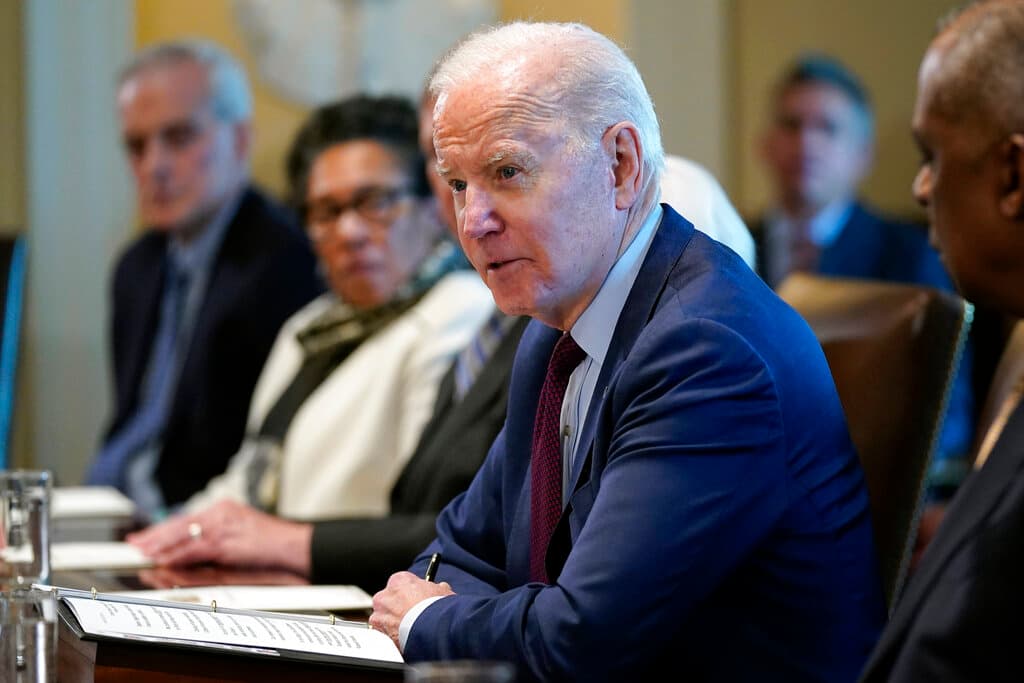President’s Recent Moves Hamper Pursuit of Help From the Saudis
Trump’s reversal of Obama’s policy begat the Abraham Accords. Biden then returned to negotiations with Iran, with little input from the Gulf states.

President Biden will have difficulty achieving his goal of reviving relations with Saudi Arabia and the United Arab Emirates while the negotiations to appease Iran dominate America’s Mideast policy.
In a phone call with King Salman last week, Mr. Biden requested an increase in Saudi Arabia oil production — only to be rebuffed by the aging monarch, who said he would stick with drilling quotas set by OPEC and Russia.
Worse, as the Wall Street Journal reported Tuesday, the two power players in Gulf politics — the Saudi crown prince, Mohamed bin Salman, and his United Arab Emirates counterpart, Mohamed bin Zayed — declined to even take calls from the American president.
That would have been unthinkable only a few years ago. Their undiplomatic snub discloses simmering anger at Mr. Biden’s return to President Obama’s attempt at “rebalancing” the Mideast toward Iran, with its harsh anti-Israel ideology, and away from the long time American-allied monarchies.
President Trump’s reversal of Mr. Obama’s policy begat the Abraham Accords — peace agreements between Israel, the UAE, Bahrain, and other Arab countries. Mr. Biden then returned to negotiations with Iran, with little input from the Gulf states that see the Islamic Republic as their top enemy.
Rebuffed by Mr. Biden, Riyadh and Abu Dhabi increasingly seek ties with America’s enemies, including most prominently Russia and Communist China.
“Where is the potential in the world today?” asked the Saudi crown prince, MBS, in an interview with the Atlantic. “It’s in Saudi Arabia. And if you” — here he was addressing America — “want to miss it, I believe other people in the East are going to be super happy.”
People, no doubt, like, say, those who rule Communist China.
How did we get here?
Early in his presidency Mr. Biden signaled intentions to chill relations with the Saudis. On the campaign trail he singled out Saudi Arabia as an example of how even allies would get the cold shoulder under his promised “human rights-based” foreign policy.
Mr. Biden cited the assassination of the Saudi national Jamal Khashoggi, a permanent resident of America. For the most part, similarly gory assassinations of regime opponents across the Mideast, including most prominently in Iran, went unmentioned.
Also overlooked by Mr. Biden were MBS’s unprecedented internal reforms, including improved rights of women, an opening of the country to Western influence, and the sidelining of the previously dominant role of Islamist clerics in the country’s social life and legal system.
While MBS’s Saudi Arabia is far from an Athenean democracy, his agenda, dubbed Vision 2030, promises wider reforms and a turn of the country’s economy away from an almost sole reliance on petrodollars.
The crown prince is often criticized by Washington for his uneven execution of the Yemen war. In 2021 the State Department removed Yemen’s anti-American rebels, the Houthis, from its list of terrorist organizations. Arms deliveries to Saudi Arabia and the UAE ceased as the Biden administration cited their cruel prosecution of the Yemen war.
At the same time, the Houthis’ Iranian patrons — who have armed, trained, and urged the group to escalate the war against Saudi Arabia — were spared criticism by the Biden camarilla. As one of our savviest former national security advisers, John Bolton, wrote this week, the West showed “pre-existing hostility toward Saudi Arabia and the UAE,” while the Houthis “played the victim card” and the Iranian role was widely overlooked.
In January, the UAE assumed the United Nations Security Council seat traditionally reserved for an Arab country. This month it serves as the council’s president. In an early move, the UAE ambassador to the U.N., Lana Nusseibeh, angered Washington by abstaining in a vote on a proposed resolution on the Ukraine crisis.
The UAE has ties to both Russia and Ukraine, Ms. Nusseibeh explained, adding, “we’ll use them to help and support in whatever way we can.” Diplomats in Turtle Bay, however, said the real reason Abu Dhabi abstained was anger at America’s Yemen policies.
Ms. Nusseibeh managed to convince Security Council members to extend an arms embargo on the Houthis, in a resolution that called the group “terrorist.” Yet despite constant missile and drone attacks on civilians at Dubai and Riyadh, which Mr. Biden’s aides referred to as “terrorism,” Washington remains opposed to reinstate the Houthis’ terrorism designation.
In Washington, critics are befuddled the way the Biden administration is behaving toward the Gulf. “Mohamed bin Zayed in the Emirates in particular is one of America’s strongest allies and supporters in the Middle East, and President Biden has given them the cold shoulder in the last 14 months,” Senator Cotton told Fox News today.
One reason Mr. Biden has turned away from traditional Gulf allies is a belief that fossil fuels need to be replaced by greener sources of energy. Now, however, energy prices are way up, and after Mr. Biden decided to stop importing oil from Russia, “we are engaging with big oil producers around the world to meet that demand,” the White House press secretary, Jen Psaki, floundered today.
Hence Mr. Biden is turning to the most significant foreign producer that can help in that regard, Saudi Arabia. Yet America has for months involved European, Chinese, and, most significantly, Russian diplomats in negotiations with the Gulf States’ biggest nemesis, Iran.
And while at it, the administration hardly pays attention to worries of Iran’s foes — Saudi Arabia, the UAE, and, for that matter Israel. Were Mr. Biden serious about mending ties with the Gulf states, then he would publicly reexamine his approach to Iran — and start heeding the concerns of those most threatened by the Islamic Republic that holds Iran in its grip.

